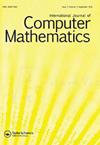带分段常数参数的混合型脉冲微分方程的数值振动与非振动分析
IF 1.3
4区 数学
Q2 MATHEMATICS, APPLIED
International Journal of Computer Mathematics
Pub Date : 2023-10-22
DOI:10.1080/00207160.2023.2274277
引用次数: 0
摘要
摘要本文研究了具有分段常数参数的线性混合型脉冲微分方程的Runge-Kutta方法的振动性和非振动性。得到了数值解振荡和非振荡的条件。给出了龙格-库塔方法保持分段常参数线性混合型脉冲微分方程的振动性和非振动性的条件。引入了数值解的插值函数,并讨论了插值函数的性质。结果表明,插值函数的零点收敛于解析解的零点,其精度与相应的龙格-库塔方法的精度相同。为了验证理论结果,给出了数值算例。关键词:振荡,数值解,龙格-库塔方法,脉冲延迟微分方程,常数参数,免责声明作为对作者和研究人员的服务,我们提供了这个版本的接受稿件(AM)。在最终出版版本记录(VoR)之前,将对该手稿进行编辑、排版和审查。在制作和印前,可能会发现可能影响内容的错误,所有适用于期刊的法律免责声明也与这些版本有关。本文章由计算机程序翻译,如有差异,请以英文原文为准。
Numerical oscillation and non-oscillation analysis of the mixed type impulsive differential equation with piecewise constant arguments
AbstractThe purpose of this paper is to study oscillation and non-oscillation of Runge-Kutta methods for linear mixed type impulsive differential equations with piecewise constant arguments. The conditions for oscillation and non-oscillation of numerical solutions are obtained. Also conditions under which Runge-Kutta methods can preserve the oscillation and non-oscillation of linear mixed type impulsive differential equations with piecewise constant arguments are obtained. Moreover, the interpolation function of numerical solutions is introduced and the properties of the interpolation function is discussed. It turns out that the zeros of the interpolation function converge to ones of the analytic solution with the same order of accuracy as that of the corresponding Runge-Kutta method. To confirm the theoretical results, the numerical examples are given.Keywords: oscillationnumerical solutionRunge-Kutta methodsimpulsive delay differential equationspiecewise constant argumentsDisclaimerAs a service to authors and researchers we are providing this version of an accepted manuscript (AM). Copyediting, typesetting, and review of the resulting proofs will be undertaken on this manuscript before final publication of the Version of Record (VoR). During production and pre-press, errors may be discovered which could affect the content, and all legal disclaimers that apply to the journal relate to these versions also.
求助全文
通过发布文献求助,成功后即可免费获取论文全文。
去求助
来源期刊
CiteScore
3.60
自引率
0.00%
发文量
72
审稿时长
5 months
期刊介绍:
International Journal of Computer Mathematics (IJCM) is a world-leading journal serving the community of researchers in numerical analysis and scientific computing from academia to industry. IJCM publishes original research papers of high scientific value in fields of computational mathematics with profound applications to science and engineering.
IJCM welcomes papers on the analysis and applications of innovative computational strategies as well as those with rigorous explorations of cutting-edge techniques and concerns in computational mathematics. Topics IJCM considers include:
• Numerical solutions of systems of partial differential equations
• Numerical solution of systems or of multi-dimensional partial differential equations
• Theory and computations of nonlocal modelling and fractional partial differential equations
• Novel multi-scale modelling and computational strategies
• Parallel computations
• Numerical optimization and controls
• Imaging algorithms and vision configurations
• Computational stochastic processes and inverse problems
• Stochastic partial differential equations, Monte Carlo simulations and uncertainty quantification
• Computational finance and applications
• Highly vibrant and robust algorithms, and applications in modern industries, including but not limited to multi-physics, economics and biomedicine.
Papers discussing only variations or combinations of existing methods without significant new computational properties or analysis are not of interest to IJCM.
Please note that research in the development of computer systems and theory of computing are not suitable for submission to IJCM. Please instead consider International Journal of Computer Mathematics: Computer Systems Theory (IJCM: CST) for your manuscript. Please note that any papers submitted relating to these fields will be transferred to IJCM:CST. Please ensure you submit your paper to the correct journal to save time reviewing and processing your work.
Papers developed from Conference Proceedings
Please note that papers developed from conference proceedings or previously published work must contain at least 40% new material and significantly extend or improve upon earlier research in order to be considered for IJCM.

 求助内容:
求助内容: 应助结果提醒方式:
应助结果提醒方式:


